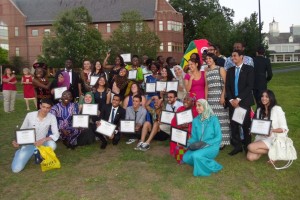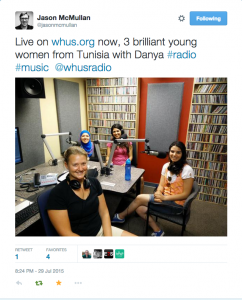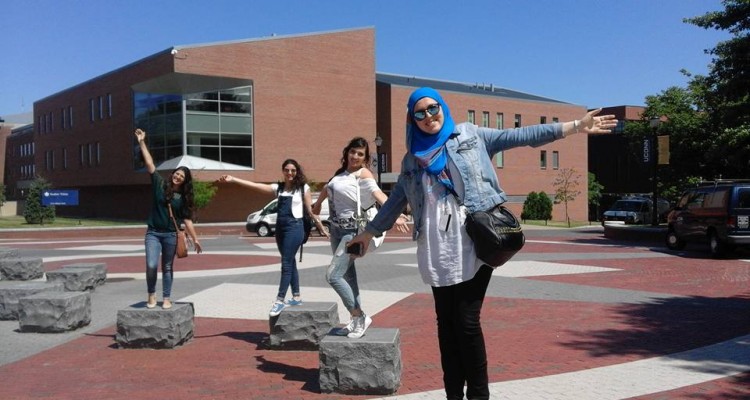By Danielle Chaloux
In Storrs, summer is in full swing. Activity on the main campus of the University of Connecticut is down to a low hum, as most full time students are off working summer jobs, internships and enjoying the occasional day at the beach. It’s not idle, however, as scores of more temporary Huskies come to campus for a wide variety of programs.
The United States Department of State sponsors one such program. The Study of the U.S. Institutes, or SUSI, program has a wide range of subjects covered at several universities nationwide. They range from Civic Engagement to Women’s Leadership.
At UConn, the educational and cultural exchange program, focuses on Social Entrepreneurship, and is developed and delivered by the University’s Global Training and Development Institute.

The 40 students involved in the SUSI Program at UConn pose for a group photo in front of Spirit Rock. Photo Credit: Danielle Chaloux
In the words of Rim Rejeb, a participating student from Tunisia, “We come here to learn more about social entrepreneurship, and everyone in the program, in the group, has to bring his own project idea and work on it and try to present it.”
Students examine topics such as microfinance, grant writing, risk analysis, and strategic business planning to prepare for their presentations, which include a business plan and a marketing strategy.
Wiem Chamsi, also a Tunisian student, explained her project, “My project, I call it by the French name, Epicerie Solidaire, google traduction: Solidarity Grocery. Facing the problem of unemployment and the increase in the phenomenon of begging, my solution for the problem was creating, it’s like a humanitarian shop, which allows poor people to get whatever they want from the shop, but it’s not going to be for free. They have to be engaged, and volunteer in the shop, and do something that’s related to its activity.”
With students from 10 different countries involved, the projects are varied. Some, such as Wiem’s, offer solutions to help the poor, while others aim to improve education or nutrition or access to resources to start a new business.
The program also incorporates making international connections. A homestay experience is included, and to some students, it’s the highlight of the program.
Tunisian computer science student, Moona Balghouthi explains, “I think interacting with the locals here. Because for me, places don’t have any meaning unless I really interact with a person. Human being interaction is much more important that just taking photos with walls.”
The homestay affords an opportunity to interact with real American families, and to dispel some of the myths and stereotypes perpetuated by American movies.
Moona said, “The majority of us were expecting the mulholuud American family, they watch TV and sit in the couch. So that’s what most of us were really afraid of. But actually, I end up with a really healthy style family, I didn’t even believe it at first!”

From left, Rim Rejeb, Moona Balghouthi, and Wiem Chamsi in the WHUS Studio with Danielle Chaloux (front).
After their stay at UConn, the group will travel to New York, Philadelphia, and Washington D.C., on a study tour to learn even more about American culture before heading home.
In November, the students will present their projects to Ashoka, a global organization that identifies and invests in leading social entrepreneurs, with the hopes of earning a grant to implement social change in their home countries.



